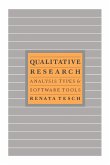First published in 1990. There was a time when most researchers believed that the only phenomena that counted in the social sciences were those that could be measured. To make that perfectly clear, they called any phenomenon they intended to study a 'variable', indicating that the phenomenon could vary in size, length, amount, or any other quantity. Unfortunately, not many phenomena in the human world comes naturally in quantities. If we cannot even give a useful answer to what qualitative analysis is and how it works, then it seems rather incongruent to try and involve a computer, the very essence of precision and orderliness. Isn't qualitative analysis a much too individualistic and flexible an activity to be supported by a computer? Won't a computer do exactly what qualitative researchers want to avoid, namely standardize the process? Won't it mechanize and rigidify qualitative analysis? The answer to these questions is NO, and this book explains why.
Hinweis: Dieser Artikel kann nur an eine deutsche Lieferadresse ausgeliefert werden.
Hinweis: Dieser Artikel kann nur an eine deutsche Lieferadresse ausgeliefert werden.









